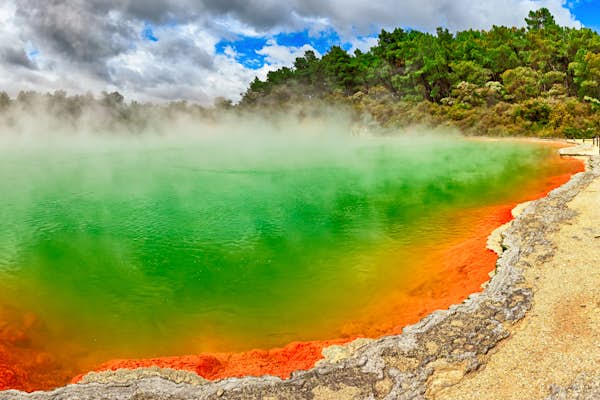Shoulder season prices can often mean compromising on the destination – maybe the days aren’t as warm as you’d hoped, the local bars and restaurants quieter than expected.
Well, it doesn’t have to be that way. Make the seasons work for you with these ultimate adventures that give you more bang for your buck, without losing out on all the elements that make your trip a dream escape.

Save big on a steamy drive in New Zealand
Good, quiet, scenic roads; sleeping in out-of-the-way places; the chance to go wherever the mood takes you… There are few better ways to explore New Zealand than by campervan. High summer seems best for a road trip, but hiring a camper outside peak season can be up to 50% cheaper. Autumnal May is a good halfway house: lower prices but still not too cold, and better driving conditions than winter.
Stick to the North Island, which will be warmer: 14°C (57°F) in Auckland versus 7°C (45°F) in Queenstown. It’s also bubbling with geothermal activity: warm up at Rotorua and Lake Taupo’s hot-spring complexes, or find wild-and-free thermal pools such as Kerosene Creek (near Rotorua), which has a hot waterfall. There’s also plenty of non-weather-dependent fun: blackwater raft through Waitomo’s glowworm caves, shelter amid the Hobbiton film set, or walk beneath Waipoua Forest’s towering kauri trees.
- Trip plan: From Auckland, spend a week or two looping south to Wellington and back. With more time, add on Northland, north of Auckland.
- Need to know: Distances can be deceptive, due to hilly, twisty roads – allow lots of time.
- Other months: Dec-Feb – warmest, priciest; Mar-May & Sep-Nov – mild/cool, cheaper; Jun-Aug – winter, tougher driving.

Head to Cuba for Caribbean heat and hip action
If you like it hot, in all manner of ways, choose Cuba in May. Technically, it’s the first month of the wet, hot, low season on this coolest of Caribbean isles. But in reality, temperatures don’t get uncomfortable until June, and heavy rains don’t fall until late July. There are ‘off-season’ bargains to be found too.
With the mercury around 30°C (86°F), this is a good month for sun-seekers – try the palm-swayed Varadero peninsula for all-inclusive resorts (many good for families), or head to one of Cuba’s 900-odd white-sand cays. Combine beach time with sizzling salsa – there’s nowhere better to watch or learn this hot, hip-shimmying dance. Go to the clubs of Havana or cobbled, colonial Trinidad. You’ll be too busy mastering your steps to be bothered by the chance of rain.
- Trip plan: Explore Old Havana, on foot and by vintage car; if you have time, take a salsa course. Varadero is two hours east of Havana.
- Need to know: Cuba has two units of currency: Cuban peso (CUP, for locals) and convertible peso (CUC, used by tourists).
- Other months: Dec-Apr – cool, dry, high season; May-Jun – shoulder months, temperatures rising, wetter; Jul-Nov – hotter, wettest (Aug-Oct: stormiest).

Ride the rails for less in super springtime on the Orient Express
It’s the classic train route: the eastward journey from Paris to İstanbul, skimming across Europe via some of its grandest cities to reach the edge of Asia. Its very name evokes an era of wood-panelled glamour, when train travel was at its most romantic. Today, the Venice-Simplon Orient Express (which runs London–Venice) aims to recapture this romance – for those who have pots of cash. Alternatively, you could use a rail pass to chart your own version of the famed route, using much cheaper scheduled trains.
Plan your trip for May, when you’re likely to find lovely weather all along the way. Leave the springtime boulevards of Paris for pink-tinged medieval Strasbourg. Continue to beery Munich, the music halls of Vienna, art nouveau Budapest, grittier Belgrade and east-meets-west Sofia before reaching the shores of the Bosphorus in İstanbul. You might not get butler service, but the joy of watching the continent unfurl remains.
- Trip plan: The Paris–İstanbul journey could be done in four days, linking trains, but allow longer to stop off and explore en route.
- Need to know: Various types of rail pass are available; younger and older travellers are eligible for discounts.
- Other months: Apr-Jun & Sep-Oct – good weather; Jul-Aug – very hot; Nov-Mar – cold.

Embrace the beginning of Costa Rica’s ‘green’ season
Costa Rica feels like a natural theme park, Mother Earth at her most flamboyantly Disney. It’s almost too perfect: varied yet conveniently compact; wild-seeming yet with outstanding infrastructure; laden with danger (raging rivers, active volcanoes) yet totally safe; visionary in its eco-ethos; unbelievable in its biodiversity. Oh, and jungle zip lining was invented here.
Even its rainy season is given a positive spin. It’s not ‘wet’, it’s ‘green’, and the country looks even more alive. Waterfalls churn, and more rivers open for rafting. Also, in May (the beginning of the ‘green’), there’s still lots of sunshine, but accommodation prices can drop by 30% and the national parks are less busy. The surf is up too.
- Trip plan: Fly to capital San José or Liberia. The latter is in Pacific-side Guanacaste province, the driest part of Costa Rica, which is often still dry in May – a good beach option. Also visit parks such as Monteverde Cloud Forest and Manuel Antonio to fully appreciate the greenness.
- Need to know: Travel can be more difficult during rainy season – allow for delays.
- Other months: Dec-Apr – drier, peak season; May-Jun & Nov – wet, cheaper; Jul-Aug – wetter, busy; Sep-Oct – wettest.
Looking for more inspiration? Check out our book Where To Go When for 360 ultimate escapes from family-friendly adventures to animal encounters and relaxing retreats.
http://shop.lonelyplanet.com/world/where-to-go-when-1/
